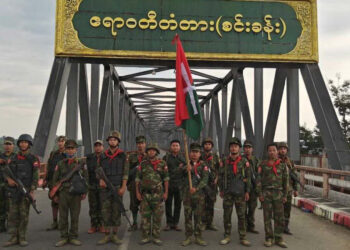Thailand has invited regime leader Min Aung Hlaing to a regional summit that it will chair next month, becoming the second country in the world after Russia to welcome the leader of a 2021 coup that has devastated Myanmar.
Currently, Thailand is chairing the Bay of Bengal Initiative, a regional organization that links South and Southeast Asian countries on the rim of the Bay of Bengal, including Bangladesh, Bhutan, India, Nepal, and Sri Lanka, Myanmar and Thailand.
The summit was planned and agreed upon when the foreign ministers of the Bay of Bengal Initiative for Multi-Sectoral Technical and Economic Cooperation (BIMSTEC) met informally in Bangkok in July.
Thai PBS World reported that all BIMSTEC leaders, including Min Aung Hlaing, have been invited to attend the summit. Indian Prime Minister Narendra Modi was the first leader to confirm his participation.
Igor Blazevic, a human rights campaigner and a senior adviser at the Prague Civil Society Centre, told The Irrawaddy that by inviting the junta’s head to the summit, the new Thai government is following the same mistaken path as its predecessor.
“Thailand and India are sharing the same level of responsibility for a dangerous, mistaken and short-sighted policy toward Myanmar,” he said.
Thailand’s previous government—led by Prime Minister Parayut Chan-o-cha—was frequently accused of being too cozy to the junta, but it had never invited Min Aung Hlaing to visit the country after the coup. India is also engaged with the junta, but it has not invited Min Aung Hlaing to New Delhi since he seized power.
“They [are betting] that the junta will prevail in its war of terror against the people of Myanmar … However, if one follows post-coup dynamics one knows that this is a war Min Aung Hlaing cannot win,” he explained.
The junta has intensified efforts to gradually gain regional acceptance because it is aware that cannot win militarily at present and it is also struggling financially, Blazevic said.
BIMSTEC offers the junta an easy entry because both India and Thai share the same approach, he explained, warning, however, that both countries are encouraging Min Aung Hlaing to escalate violence and to try to consolidate control through crimes and atrocities.
Min Aung Hlaing came to power by leading an internationally condemned coup against a democratically elected government in 2021. His regime has been under international sanctions for committing atrocities, including air strikes on civilians, extrajudicial killings and arresting civilians who reject military rule.
The junta has killed more than 4,100 people since the coup, rights groups say.
Min Aung Hlaing has been shunned internationally. Even the Association of Southeast Asian Nations (ASEAN), in which Myanmar is a member, has banned him from its summits for his failure to implement its peace plan—a plan he agreed to.
Even China, Myanmar’s biggest neighbor and ally, still refused invites to invite him to Beijing despite close economic ties, including sales of weapons.
Prior to Thailand’s invitation to BIMSTEC, Russia—a major seller of arms to the regime—was the only country that openly embraced the junta leader. Min Aung Hlaing met Russian President Vladimir Putin last year.
In June, Thailand’s outgoing foreign minister, Don Pramudwinai, invited foreign ministers from ASEAN, including the foreign minister of Myanmar’s junta, to prepare the way to “fully reengage Myanmar at the leaders’ level”. Singapore, Indonesia, and Malaysia shunned the talks held in the resort of Pattaya on June 18 and 19.
The junta permitted Don to visit Myanmar’s detained leader Daw Aung San Suu Kyi the next month, after rejecting requests from ASEAN and UN envoys to meet her. Don became the first foreign national to meet her since she was jailed.
Thai PBS reported that the upcoming summit will be held on November 30 and that BIMSTEC leaders will discuss digital payment systems, trade settlements, strengthening cyber-security cooperation, preventing transnational crimes, the BIMSTEC Grid Interconnection, agriculture technology, cultural cooperation, youth exchange and diplomatic training.

















